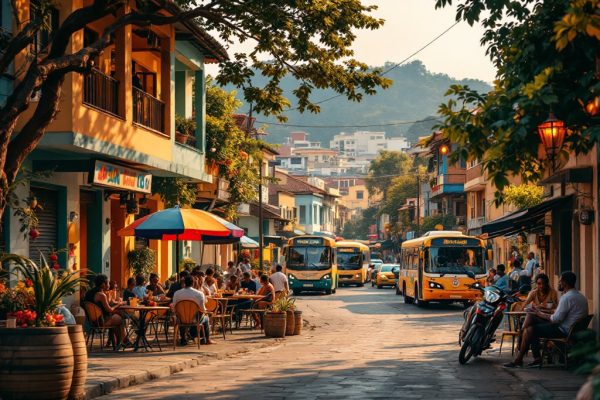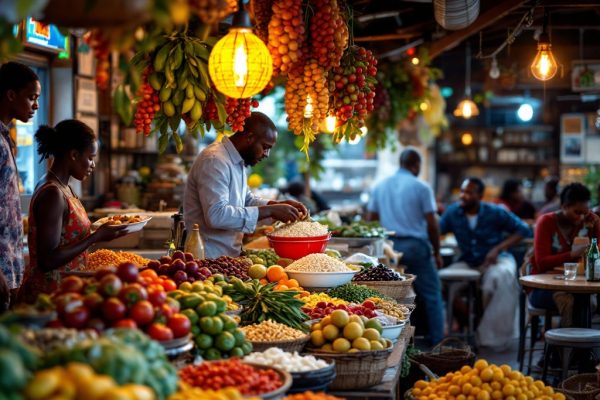Average Cost of Living in Kenya
Dreaming of a more affordable life? Kenya’s cost of living is significantly lower than in the US or UK, with expenses for a family of four averaging around 320,508 KSh monthly. Discover how much you could save on rent, groceries, and dining, with restaurant prices up to 70.8% lower and rent a staggering 81.3% less. Learn how to navigate Kenya’s cost of living, from accommodation and transportation to healthcare options, and explore the potential for a richer life on a leaner budget. Start planning your Kenyan adventure today!
Important information

- Kenya’s cost of living is significantly lower than in the US and UK. Rent, groceries, and restaurant prices are all much cheaper.
- The average net salary in Kenya is 46,157.89 KSh per month, notably lower than in the US. Monthly expenses for a single person (excluding rent) are around 65,936.70 KSh.
- Public transportation is affordable, with single rides costing $0.77 and monthly passes $27.50. Utilities for a 915 sq ft apartment are about 3,721 KSh monthly.
- While private healthcare offers better facilities and quicker access than public options, expats should consider international health insurance for more comprehensive coverage.
- Although the cost of living is lower, it’s important to remember that local purchasing power is also lower than in Western countries.
Average Cost of Living in Kenya
Kenya offers a considerably more affordable lifestyle compared to the US or the UK. A family of four can expect monthly expenses of around 320,508 Shillings, while a single person can budget approximately 167,739 Shillings. Living costs can vary, especially in major cities like Nairobi.As of January 2025, Kenya’s cost of living index is 30.2. Excluding rent, a single person can expect monthly expenses of about $510.70 (65,936.7 KSh) for necessities like food, transportation, and utilities. This is a significant 61.4% decrease compared to the US.
Cost of Living Comparison (Kenya vs. US)
- Restaurant Prices: 70.8% lower in Kenya.
- Groceries: 60.4% cheaper in Kenya.
Housing Costs (Kenya vs. US)
- Overall Housing Costs: 77.2% less in Kenya.
- Rent: 81.3% lower in Kenya.
It’s important to note that local purchasing power is also 76.6% less in Kenya. Your main expenses will likely be housing, food, and transportation, followed by healthcare and utilities. Several factors influence these costs, including location, lifestyle choices, the economic climate, and global events.
Cost of Living Index and Comparisons
Kenya offers a significantly lower cost of living compared to many other countries. Attractive rental rates benefit both locals and expats. Affordable food and transportation further enhance this advantage. While imported goods may be pricier, overall, Kenya provides excellent value, making it a desirable place to call home. Individual spending habits, of course, play a role in the final cost. Here’s a breakdown of some key areas:
Accommodation
Rental costs in Kenya are notably lower than in many Western nations, offering a variety of options from apartments to houses across different price points.
Food
Locally sourced produce, groceries, and dining out are generally inexpensive, allowing for significant savings on daily expenses.
Transportation
Public transport, including buses and matatus (minibuses), is readily available and affordable, making it easy to navigate Kenyan cities and towns.
Imported Goods
While imported goods can be more expensive, focusing on local products can help maintain a lower cost of living.
Income and Purchasing Power
The average net salary in Kenya is around 46,157.89 KSh monthly after taxes. This significantly impacts Kenyans’ purchasing power, affecting their access to essential goods and services. These include housing, food, transportation, and healthcare. This income level dictates lifestyle choices relative to the cost of living. It shapes Kenya’s standard of living and reveals the economic realities faced by many.
Average Monthly Net Salary in Kenya
Kenyans earn an average net salary of roughly 46,157.89 KSh after taxes. This is significantly lower than the average U.S. net salary of 163,360.76 KSh. Despite the lower average income, the cost of living in Kenya can be substantial. A single person can expect monthly expenses around 65,936.70 KSh, excluding rent. For a family of four, these costs escalate significantly, reaching approximately 236,207.70 KSh monthly, also without rent.
Kenya
Average net salary: 46,157.89 KSh
Monthly expenses (single person): 65,936.70 KSh (excluding rent)
Monthly expenses (family of four): 236,207.70 KSh (excluding rent)
USA
Average net salary: 163,360.76 KSh
Local Purchasing Power in Kenya
Kenya offers a considerably lower cost of living compared to the US, even with a reduced purchasing power of approximately 76.6%. Expenses excluding rent are around 56.6% lower in Kenya, and this difference widens to 64.8% when rent is included. This substantial difference is primarily due to significantly lower rent prices in Kenya, which are about 81.3% less than in the US. Restaurant prices also contribute to the lower cost of living, being approximately 63.6% cheaper in Kenya. For example, monthly utilities for a 915 sq ft apartment (electricity, heating, cooling, water, and garbage) average around 4,113.35 Kenyan shillings (KSh). High-speed internet (60 Mbps or more) costs approximately 4,865.50 KSh per month, while a comprehensive mobile phone plan with ample data (10GB+) and calls is around 1,894 KSh monthly.
Accommodation Costs in Kenya
Housing costs in Kenya constitute a substantial part of personal budgets, making up approximately 18.3% of monthly expenses. A one-bedroom apartment in Nairobi’s city center typically costs around 37,192.41 KSh. Rent prices vary significantly across urban areas. Mombasa, Eldoret, Kisumu, and Nakuru each have distinct rental markets with varying price ranges. The choice between renting and buying a home presents unique financial considerations. Housing expenses are a key factor in Kenyan household finances.
Rent Prices in Nairobi, Mombasa, Eldoret, Kisumu, and Nakuru
Nairobi has the highest average rent in the region, followed by Mombasa. A one-bedroom apartment in Nairobi’s city center costs around 37,272 KSh, while similar apartments outside the center average about 18,163 KSh.
Mombasa’s rental market is generally more affordable than Nairobi’s. Smaller cities like Eldoret, Kisumu, and Nakuru offer even more budget-friendly options.
Cost of Renting vs. Buying Property
Renting typically involves lower upfront costs. Renters pay a security deposit and monthly rent, but they avoid the significant initial expenses associated with homeownership, such as down payments and closing costs.
Ongoing expenses for renters are generally limited to rent, utilities, and renter’s insurance, which can be more predictable and manageable than the costs of homeownership.
Buying a home in Kenya requires a substantial upfront investment, including a down payment, closing costs (legal fees, transfer taxes, etc.), and mortgage origination fees. These initial expenses can be a barrier for some.
Homeowners face ongoing expenses like mortgage payments, property taxes, homeowner’s insurance, and maintenance costs. These recurring costs can be substantial and should be carefully considered.
Carefully assess your financial situation, including your income, savings, and debt-to-income ratio, to determine whether you can comfortably afford the upfront and ongoing costs of homeownership. Consider your long-term goals as well. If you plan to stay in the same area for an extended period, buying a home can be a good investment. However, if you anticipate moving soon or prefer more flexibility, renting might be a better option.
Impact on Monthly Expenses
Housing is a significant expense for Kenyans, often consuming a large portion of their budgets through rent or mortgage payments. This financial strain leaves less for essential needs like food, transportation, and utilities. Therefore, careful budgeting, especially when considering housing costs, is crucial for sound financial management in Kenya.
Food and Dining Expenses
Dining in Kenya is remarkably affordable. A basic restaurant meal costs approximately 500 Kenyan shillings (KSh), while a three-course meal for two at a mid-range restaurant is around 4,000 KSh. Groceries are also budget-friendly, with a pound of rice at about 83 KSh and a loaf of fresh white bread around 62 KSh, making daily cooking an economical option.
For those on the go, fast food offers a convenient choice. A combo meal, such as one from McDonald’s, costs around 750 KSh. A domestic beer is about 300 KSh per pint, and a cappuccino is approximately 286 KSh.
Compared to the United States, eating in Kenya offers significant savings.
- A basic meal with a drink at an inexpensive restaurant: $3.25 (Kenya) vs. $18.59 (US).
- A fast food combo meal: $5.64 (Kenya) vs. $10.47 (US).
Meal Prices and Grocery Costs
Dining in Kenya offers options for every budget. A basic meal costs around 500 Kenyan shillings (KSh), while a three-course meal for two at a mid-range restaurant is about 4,000 KSh. Monthly groceries for a single person range from $100 to $200. Common Kenyan staples include maize flour, rice, beans, and a variety of fresh fruits and vegetables. Expect to pay approximately 406.52 KSh for a gallon of milk, 204.36 KSh for a dozen eggs, and 363.62 KSh per pound of chicken fillets. Rice is about 82.87 KSh per pound, and a loaf of bread costs around 61.74 KSh. Local markets often have better prices than supermarkets, especially for fresh produce.
Example Meal Costs
Basic Meal: 500 KSh
Three-Course Meal (2 people): 4,000 KSh
Example Grocery Costs
Monthly Groceries (single person): $100-$200
Grocery Staples
- maize flour,
- rice,
- beans,
- fresh fruits and vegetables.
Average Prices of Example Products
Milk (1 gallon): 406.52 KSh
Eggs (1 dozen): 204.36 KSh
Chicken Fillets (1 lb): 363.62 KSh
Rice (1 lb): 82.87 KSh
Bread (1 loaf): 61.74 KSh
Restaurant Prices in Kenya
Dining in Kenya offers significant savings compared to the US. A basic meal with a drink costs around $3.25, which is 82.5% less than the US average of $18.59. For fast food lovers, a combo meal is about $5.64 in Kenya, approximately 46% cheaper than the $10.47 price tag in the US.
Prices in Kenyan Shillings (KSh)
- Basic restaurant meal: 500 KSh,
- Three-course meal for two at a mid-range restaurant: 4,000 KSh,
- McDonald’s McMeal: 750 KSh,
- Local beer: 300 KSh,
- Cappuccino: 286 KSh.
Restaurant Price Difference
Restaurant prices in Kenya are considerably lower than in the US, ranging from 63.6% to 70.8% less.
Transport Costs in Kenya
Public transport in Kenya offers a cost-effective way to travel, especially for shorter trips. A monthly pass costs approximately $27.50 USD (3,550 Kenyan shillings), while single tickets are just $0.77 USD (100 Kenyan shillings). Popular modes of public transport include matatus (minibuses) and buses, with fares ranging from $0.30 to $1 USD.
Public Transport in Nairobi
Traveling around Nairobi using public transport is budget-friendly. Single rides are priced at about $0.77 USD, and a $27.50 USD monthly pass offers significant savings for frequent travelers.
Taxi Fares in Nairobi
Taxis in Nairobi have a base fare of 200 KSh, with an additional charge of approximately 321.87 KSh per mile.
Driving in Nairobi
Petrol costs around $4.40 USD (768 KSh) per gallon. Besides fuel, driving expenses include insurance and vehicle upkeep. Nairobi’s traffic congestion can substantially increase both travel time and costs.
Public Transport and Monthly Passes
Public transport in Kenya offers remarkable affordability, especially for regular commuters. Monthly passes cost approximately 3,550 Kenyan shillings (KSh), equivalent to just $27.50 USD. This makes commuting significantly cheaper than in other countries, like the United States.
Even single rides are inexpensive, at roughly 100 KSh ($0.77 USD). In contrast, a monthly pass in the United States averages $65.00, with single rides costing around $2.50. This highlights the substantial cost savings when using Kenya’s public transport.
Transportation Costs in Cities
Getting around Kenya’s cities is budget-friendly. A single bus or matatu ride costs approximately 100 Kenyan shillings (KSh), which is about $0.77. For frequent travelers, a monthly pass is a good option, priced at around 3,550 KSh ($27.50). Taxis are readily available, with fares starting at 200 KSh and costing roughly 322 KSh per mile. For those driving, petrol is about 768 KSh ($5.65) per gallon. Public transport, including buses and matatus, provides a cost-effective way to explore the city.
Utilities and Household Bills
Living in a typical Kenyan apartment means budgeting around 4,113.35 KSh monthly for utilities like electricity, water, and garbage collection. Internet and mobile phone services offer various plans and bundles, allowing you to choose one that suits your usage and budget.
Cost of Utilities
For a typical 915 sq ft apartment in Kenya, expect monthly utility costs (electricity, heating, cooling, water, and garbage) around 3,721 Kenyan Shillings (KSh). Adding high-speed internet (60 Mbps or more) brings the total to approximately 9,137 KSh, with internet costing around 5,416 KSh. A mobile phone plan with ample data (10GB+) and calls adds another 1,894 KSh per month.
Compared to the US, Kenyan utilities are significantly more affordable. A similar apartment’s utilities cost just $31.86 USD in Kenya, versus a hefty $208.05 USD in the United States.
Internet and Mobile Phone Plans
High-speed internet in Kenya averages around 4,865.50 KSh per month, a significant expense.
Mobile plans offer a budget-friendly alternative, providing calls and over 10GB of data for approximately 1,869.23 KSh monthly. This makes mobile a cost-effective choice.
Healthcare Costs in Kenya
Kenya’s Healthcare Index is 48.81, reflecting the country’s overall quality of care. The private healthcare sector excels with superior hygiene and facilities, while the public sector lags. Therefore, international health insurance is essential for expats, offering comprehensive coverage. Many expats choose private care for faster access and advanced treatment. Private hospitals typically offer shorter wait times and state-of-the-art equipment.
Private Healthcare
- superior hygiene,
- better facilities,
- faster access to care,
- advanced treatments,
- shorter wait times,
- state-of-the-art equipment.
Public Healthcare
The public healthcare sector in Kenya faces challenges and generally lags behind private healthcare in terms of facilities and resources. This makes international health insurance a crucial consideration for expats seeking reliable and high-quality medical care.
Health Care Index in Kenya
Kenya has two healthcare systems: public and private. The public system is funded by the government. Private care is funded by out-of-pocket payments and private insurance. Expatriates often choose private healthcare due to its superior hygiene, better facilities, and shorter wait times. Additionally, it is more cost-effective compared to many Western countries.
Private Healthcare vs. International Health Insurance
Kenya’s private healthcare system offers cleaner facilities and higher standards compared to public options, making it a popular choice for expats seeking faster treatment. However, the higher cost often necessitates exploring international health insurance. These plans typically offer more comprehensive coverage, including benefits like medical evacuation. Choosing the best healthcare option depends on individual needs and budget. Consider these factors when making your decision:
Private Healthcare
- Cleaner facilities and higher standards than public options.
- Faster treatment for expats.
- Higher cost may require additional financial planning.
International Health Insurance
- More comprehensive coverage.
- Benefits like medical evacuation provide added security.
- Various plans cater to different needs and budgets.
Carefully consider both private healthcare and international insurance options to determine the best fit for your individual circumstances.











